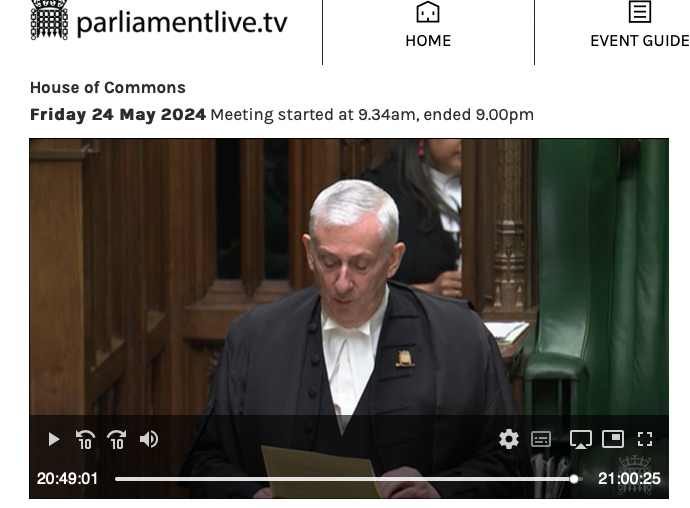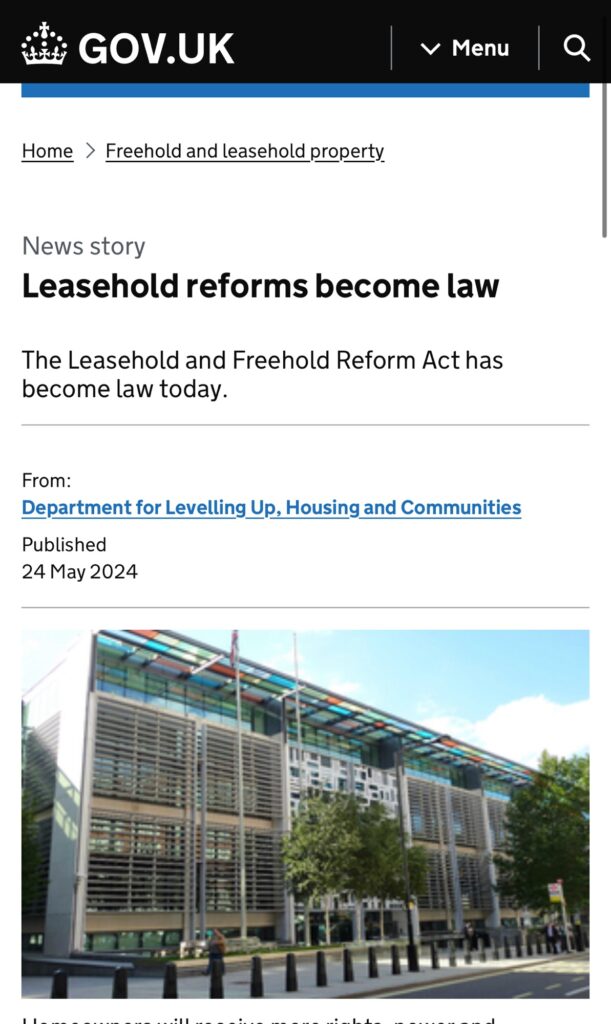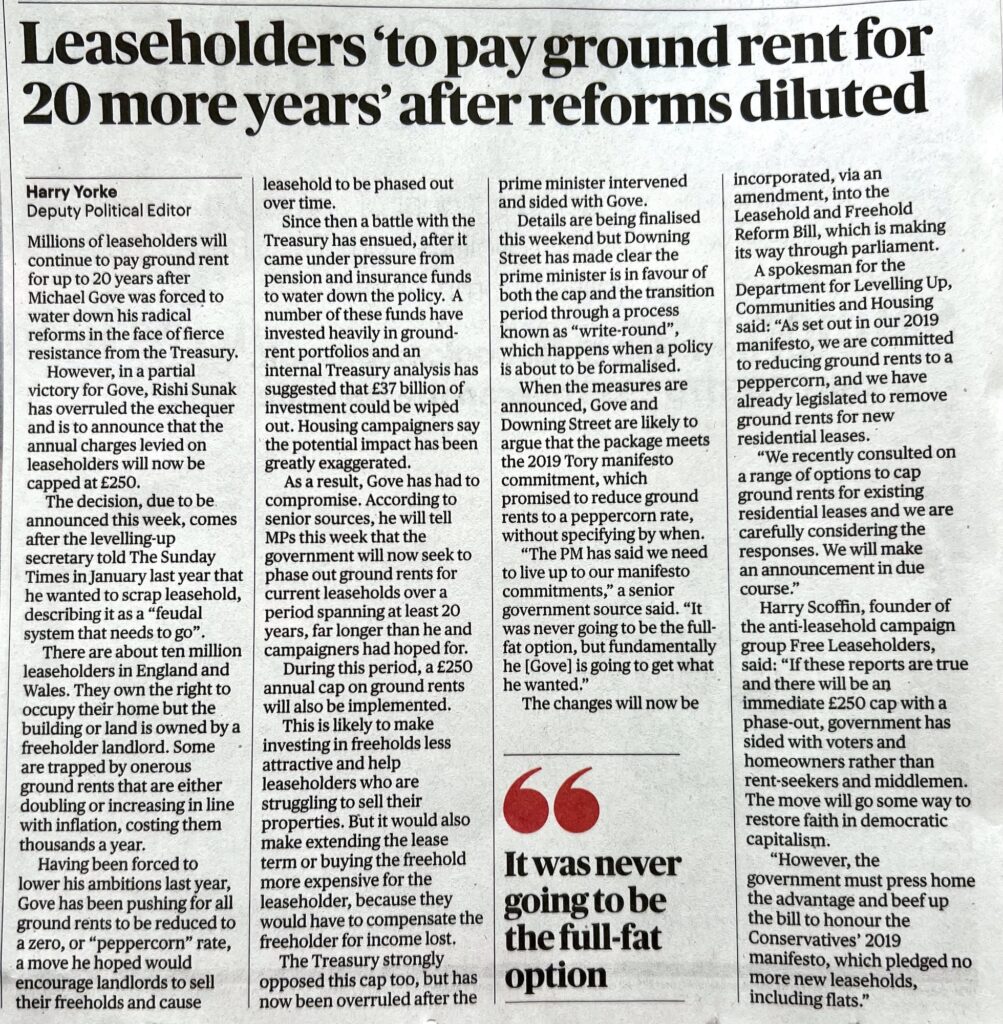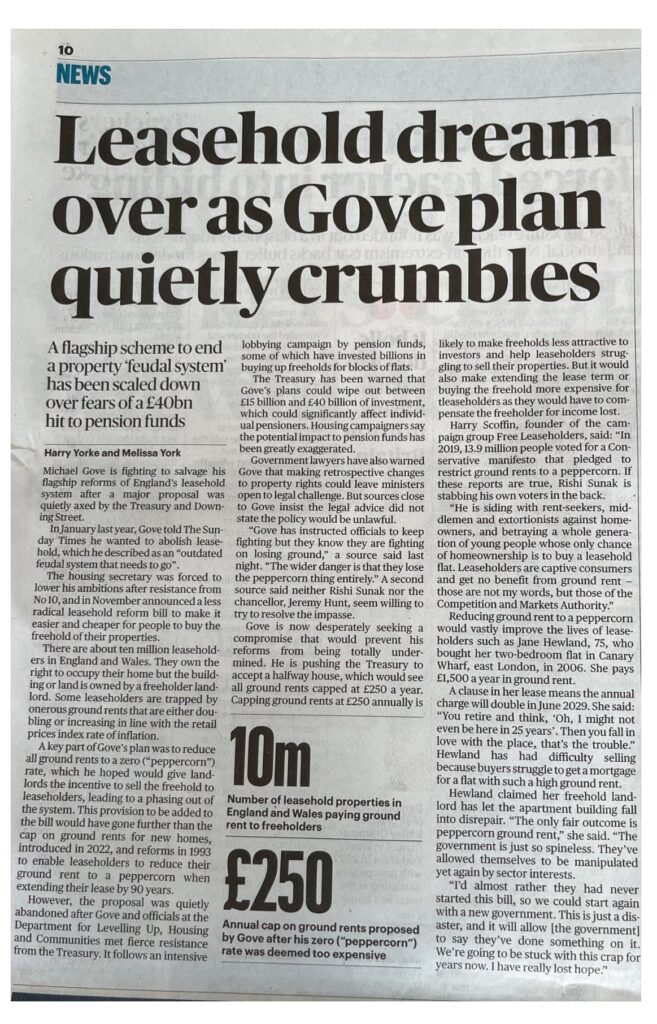Some initial thoughts from an enfranchisement perspective… Leasehold history is made on the 24th May 2024 as the Leasehold and Freehold Reform Bill is passed into law. The next question is ‘when does it come into force?’ – For some thoughts on that and the new law generally, read on below…

The speaker reads out the list of new Acts passed at the end of this session of parliament ending with the Leasehold and Freehold Reform Act 2024. A link to the Parliament TV coverage of that moment appears below:
https://parliamentlive.tv/event/index/bd4e0af0-072c-4522-aef6-5895859b4780?in=20:49:01
Leasehold Reform News – and an election to boot
Mr Sunak’s sudden move to call a general election on Wednesday 22nd May threw parliament into a final splurge of business and in the ‘wash up’ resulting from this we have the birth of the Leasehold and Freehold Reform Act 2024 (‘the 2024 Act’).
The 2024 Act made it onto the statute books on 24th May 2024, just two days after the election announcement and as the final session of this parliament was brought to a close as the very last Bill passed in this parliamentary session.
So, it is an Act of Parliament and no longer a Bill. So, it really is time to say ‘welcome’ to a whole new world of leasehold reform…
Lots of people have been asking questions and I thought it might be helpful to summarise some points below.
What is in the Act?
Essentially all the much talked about changes are there. The 990-year lease extension, abolition of the two-year rule and the change in qualification criteria for mixed use buildings. In addition, we will see the end of marriage value for leases under 80 years and the end of the ability for the landlord to recover their costs from the tenant under a standard statutory claim. There are also the changes that relate to property management.
The valuation changes will mean that most valuations will to be on the ‘standard’ basis – effectively a term and reversion calculation with a presumed 0.1% cap on the ground rent when valuing the freeholder’s interest.
In addition, there is a ban on the creation of new leasehold houses.
What is not in the Act?
The much-discussed cap on ground rents, whether that be at £250, a peppercorn (nil) or otherwise. The thinking had been that this might make it into the Bill, if the outcome of the consultation were published prior to the Parliamentary stages being completed and perhaps be the subject of a late-stage amendment. The truncated process meant that this could not happen and so this will have to wait for further legislation under a future government.
Is it law?
Yes, it most certainly is. The 2024 Act received the Royal Assent right at the end of the final session of this Parliament and appeared right at the very end of the list of Acts approved in the ‘wash up’ at the end of this session of parliament.
Is it in Force?
No, not yet. The operative provisions do not come into force until commencement. The version of the Bill that has been passed into law is the version subject to the 67 Government amendments made in the Lords which were passed in the expedited legislative process on Friday 24th May 2024. These amendments do not make significant changes to the general position under the Act as has been discussed so far but do tidy up some anomalies.
When does it come into force?
The commencement provisions are set out in section 123 of the Act. These state that the provisions relating to rentcharges, the shifting of costs in tribunal cases on service charges, and the BSA amendments will come into force two months after the Act is passed into law.
That being the case, by my reckoning these provisions will come into force on 24th July 2024, subject to any other amendments to the contrary by the Secretary of State.
As to the other ‘meatier’ parts of the Act, as far as leasehold reform is concerned, these are subject to commencement under Statutory Instruments (‘SI’s) – See section 123(3).
These SIs need to be made by the Secretary of State and we also know that in order to be effective the valuation changes will need various matters such as the relevant rates to be prescribed. These will need to be in place before these changes can be enacted.
This means that we will very much have to ‘wait and see’ as to when all this will come into effect.
Perhaps the most instructive thing that we can refer to on this question at the moment is the letter from Baroness Scott to Lord Kennedy in a written answer from 15th April 2024.
See:
This was an answer given as a ‘will write’ letter, which is a written answer given when a question is raised in either house, and the Minister says that she/he ‘will write’ to the member concerned with an answer.
In this Baroness Scott says that the Department is working hard to take these reforms through parliament and that the anticipated timescale will be 2025-2026 because of the need to draft the secondary legislation needed to bring these into effect.
Anyone expecting an immediate change on the valuation side (or indeed elsewhere) may well have to wait a little while therefore, given that we have the small matter of an election and a summer recess in the way.
So where does that leave us now?
Well, we know what the new Act provides. What we don’t know is the detail of how for instance some of the critical rates such as the deferment rate or capitalisation rates will be arrived at. These are to be prescribed by the Secretary of State and reviewed every 10 years (according to Para 26 of Schedule 4 and 38 of Schedule 5). This will be critical to determining value in the ‘new world.’
We will need to see the secondary legislation to see how these will be determined and, assuming the same intent as per the 15th April letter, taken at face value indicates a ‘determination to facilitate a smooth transition.’ That could mean that some of this could take some time.
And Finally
As some others have already commented, there are various parts of legislation that sometimes do not get brought into force, a good example being the provisions relating to the creation of ‘Right to Enfranchise’ companies that were in the 2002 Act. It is also possible that some of the provisions in the 2024 Act may not be brought into force, although a future government is unlikely to leave these ‘on the shelf,’ particularly given the statements that Labour have made about leasehold reform.
A week can be a very long time in politics and so I think we look to the coming weeks ahead to see what further guidance (if any) is issued by DLUHC about commencement. Given that we are now in the ‘restricted period’ (formerly called ‘purdah’) prior to an election (effective from 25th May 2024) there will be limitations on what can be done, and it may be that nothing further can be done on this until after the election.
Mark Chick
26th May 2024



